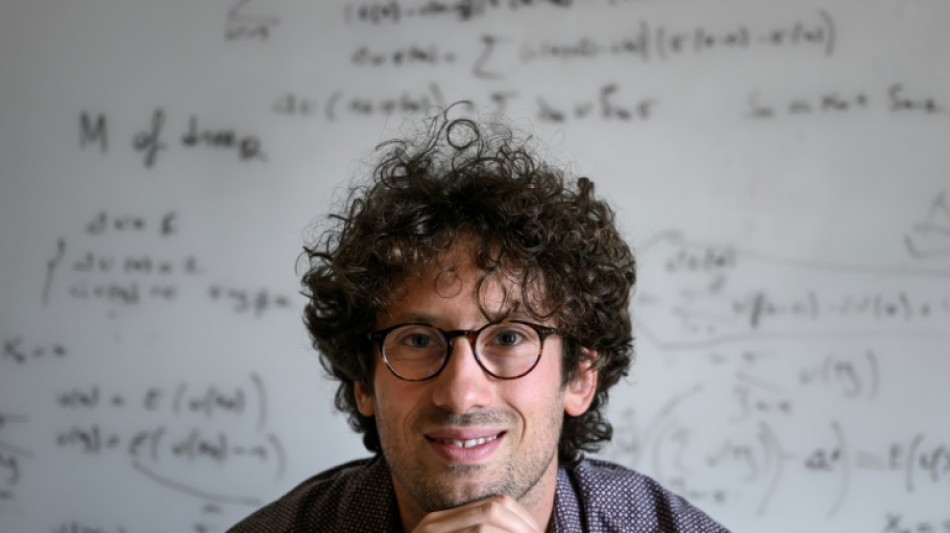
-
 Japan says US tariffs 'extremely regrettable', may break WTO rules
Japan says US tariffs 'extremely regrettable', may break WTO rules
-
South Koreans anxious, angry as court to rule on impeached president

-
 Juve at in-form Roma with Champions League in the balance
Juve at in-form Roma with Champions League in the balance
-
Injuries put undermanned Bayern's title bid to the test

-
 Ovechkin scores 892nd goal -- three away from Gretzky's NHL record
Ovechkin scores 892nd goal -- three away from Gretzky's NHL record
-
Australian former rugby star Petaia signs for NFL's Chargers

-
 China says opposes new US tariffs, vows 'countermeasures'
China says opposes new US tariffs, vows 'countermeasures'
-
Athletics world watching as 'Grand Slam Track' prepares for launch

-
 Heat humble Celtics for sixth straight win, Cavs top Knicks
Heat humble Celtics for sixth straight win, Cavs top Knicks
-
Quake-hit Myanmar's junta chief to head to Bangkok summit

-
 New Spielberg, Nolan films teased at CinemaCon
New Spielberg, Nolan films teased at CinemaCon
-
Shaken NATO allies to meet Trump's top diplomat

-
 Israel's Netanyahu arrives in Hungary, defying ICC warrant
Israel's Netanyahu arrives in Hungary, defying ICC warrant
-
Shiny and deadly, unexploded munitions a threat to Gaza children

-
 Stocks tank, havens rally as Trump tariffs fan trade war
Stocks tank, havens rally as Trump tariffs fan trade war
-
Altomare hangs on to tie defending champ Korda at LPGA Match Play

-
 Paraguay gold rush leaves tea producers bitter
Paraguay gold rush leaves tea producers bitter
-
Health concerns swirl as Bolivian city drowns in rubbish

-
 Syria says deadly Israeli strikes a 'blatant violation'
Syria says deadly Israeli strikes a 'blatant violation'
-
Financial markets tumble after Trump tariff announcement

-
 Starbucks faces new hot spill lawsuits weeks after $50mn ruling
Starbucks faces new hot spill lawsuits weeks after $50mn ruling
-
Europe riled, but plans cool-headed response to Trump's tariffs

-
 'Shenmue' voted most influential video game ever in UK poll
'Shenmue' voted most influential video game ever in UK poll
-
New coal capacity hit 20-year low in 2024: report

-
 Revealed: Why monkeys are better at yodelling than humans
Revealed: Why monkeys are better at yodelling than humans
-
Key details on Trump's market-shaking tariffs

-
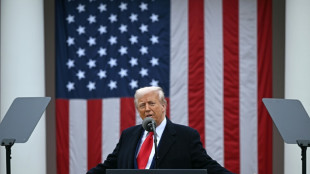 'A little tough love': Top quotes from Trump tariff talk
'A little tough love': Top quotes from Trump tariff talk
-
US business groups voice dismay at Trump's new tariffs

-
 Grealish dedicates Man City goal to late brother
Grealish dedicates Man City goal to late brother
-
US tariffs take aim everywhere, including uninhabited islands

-
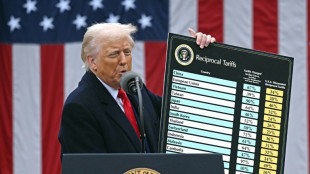 Trump sparks trade war with sweeping global tariffs
Trump sparks trade war with sweeping global tariffs
-
Israeli strikes hit Damascus, central Syria; monitor says 4 dead

-
 Slot 'hates' offside rule that gave Liverpool win over Everton
Slot 'hates' offside rule that gave Liverpool win over Everton
-
US stocks end up, but volatility ahead after latest Trump tariffs

-
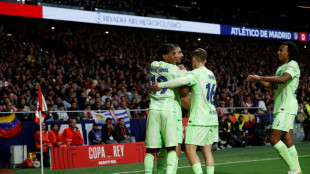 Barca oust Atletico to set up Clasico Copa del Rey final
Barca oust Atletico to set up Clasico Copa del Rey final
-
Mourinho grabs Galatasaray coach's face after losing Istanbul derby

-
 Grealish strikes early as Man City move up to fourth in Premier League
Grealish strikes early as Man City move up to fourth in Premier League
-
Reims edge out fourth-tier Cannes to set up PSG French Cup final
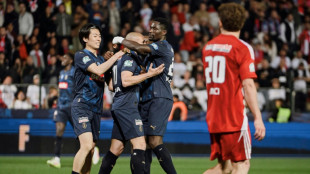
-
 Liverpool beat Everton as title looms, Man City win without Haaland
Liverpool beat Everton as title looms, Man City win without Haaland
-
Jota wins bad-tempered derby as Liverpool move 12 points clear

-
 Inter and Milan level in derby Italian Cup semi
Inter and Milan level in derby Italian Cup semi
-
Stuttgart beat Leipzig to reach German Cup final

-
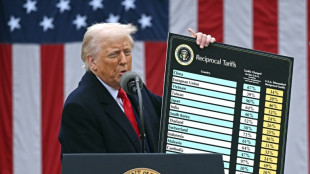 Trump unveils sweeping global tariffs
Trump unveils sweeping global tariffs
-
Italian director Nanni Moretti in hospital after heart attack: media
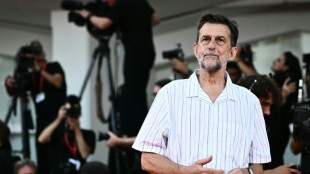
-
 LIV Golf stars playing at Doral with Masters on their minds
LIV Golf stars playing at Doral with Masters on their minds
-
Trump unveils sweeping 'Liberation Day' tariffs
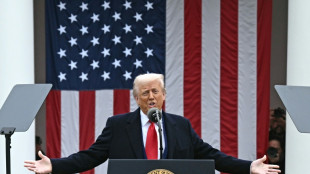
-
 Most deadly 2024 hurricane names retired from use: UN agency
Most deadly 2024 hurricane names retired from use: UN agency
-
Boeing chief reports progress to Senate panel after 'serious missteps'

-
 Is Musk's political career descending to Earth?
Is Musk's political career descending to Earth?
-
On Mexico-US border, Trump's 'Liberation Day' brings fears for future


Duminil-Copin, Fields-winning mathematician with 'aesthetic vision'
Hugo Duminil-Copin, a French mathematician whose visual approach helped him win the world's most prestigious mathematics prize the Fields Medal on Tuesday, said he "doesn't really fit into the cliches of a genius".
The 36-year-old, who has a messy head of hair and bright eyes beaming from behind glasses, told AFP that he is a "very, very normal person" who loves sport, his family and quiet moments of reflection.
But for Duminil-Copin, who specialises in probability theory, those quiet moments can lead to discoveries that won him the Fields Medal, the equivalent of the Nobel Prize for mathematics.
He accepted the prize, which is awarded every four years to mathematicians under 40, at a ceremony in Finland's capital Helsinki.
The other winners were Britain's James Maynard of Oxford University, June Huh of Princeton in the United States and Ukraine's Maryna Viazovska, who is only the second ever woman laureate.
Duminil-Copin described with unabashed enthusiasm the happiness he finds in working with others in the search for answers -- whether or not they find one.
"It's the best, especially since it's a collective process, where all the beauty is in interacting with others," he said in an interview a few days before the prize was announced.
- A visual mind -
Born on August 26, 1985, Duminil-Copin has collected a raft of mathematics awards over the last decade.
At the age of 31, he was appointed professor at France's Institute of Advanced Scientific Studies in 2016.
"It's a place that seems made for me, for my creative part," he said of the green campus outside Paris.
It gives the mathematician that most precious resource for deep thinkers: time.
"This slowness in everyday life is very fruitful because I need time for ideas to come, for them to settle quietly, for them to take shape," he said.
At the campus, which is not far from where he grew up, Duminil-Copin uses his "very visual intuition" to take on the most complicated mathematical problems.
"There are very few formulas and many drawings" in his mind when he thinks about such problems, he said.
That "aesthetic vision" allows him to view mathematics with a "certain elegance", he added.
The Paris institute allows researchers to free themselves of all other obligations, including teaching.
But Duminil-Copin teaches anyway, retaining a professorship at the University of Geneva, saying that "in the end it is perhaps the most important aspect of this profession".
He may have inherited this passion from his father, a sports teacher, and mother, a dancer who became a teacher later in life.
When he was younger, Duminil-Copin envisioned becoming a teacher himself -- of maths, of course -- but his talent propelled him towards research.
Collaboration is at the heart of his outlook. If he provides mathematical tools to physicists, their work in turn may allow someone else in the future to find new applications for them.
"It's the whole community that really produces scientific progress," he said.
- Mental balance -
Duminil-Copin hailed the importance of two university professors to his career, Jean-Francois Le Gall, who also worked on probability theory, and fellow Fields Medal winner Wendelin Werner.
He said he fell in "love at first sight" with percolation theory during a class Werner taught on the subject, which falls under the branch of statistical physics.
It was in that class that Duminil-Copin first encountered Nienhuis's conjecture -- a "beautiful, elegant and completely mysterious" problem, he said.
"I solved it a few years later, almost without doing it on purpose."
As a child, Duminil-Copin preferred astronomy to mathematics.
He said he was "not pushed at all" by his parents to focus solely on his studies -- instead they were keen to "confront him with a variety of things" such as sport, music and friends.
The lesson seems to have stuck.
"When we talk about preparing to become a researcher we think of intelligence, academic training, but there is also a mental balance which is very important," he said.
New ideas can strike him "anytime, in the middle of the night or in the shower", he said.
But they will have to wait until he's back at work.
"My priority is on the personal side, to spend time with my daughter and my wife."
L.Miller--AMWN
